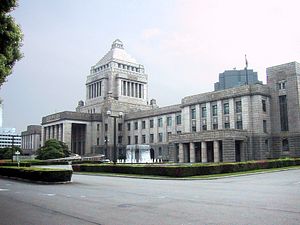Thousands in Tokyo protested last week to oppose the state secrets protection bill, in fear that it will allow the government to hide information from them. The bill, created by the Liberal Democratic Party (LDP), seeks to impose stricter penalties on those that reveal state secrets. Defense, diplomacy, counter-terrorism, and counter-espionage are the four categories that would be classified as state secrets. It is currently being negotiated between political parties in the nation’s parliament. With both Japanese opposition parties yielding to the LDP’s demands, the bill is set to pass the Upper House by early December.
In 2010, a member of Japan’s coast guard was suspended for one year after leaking classified footage of a boat between a Chinese fishing trawler and two Japanese patrol cutters in the East China Sea. The government wanted to hide the information for fear that it would damage Sino-Japanese relations. While he was not indicted for any crime, it did pave the way for the LDP to move forward on enacting the state secrets law.
In promoting the legislation, Prime Minister Shinzo Abe and his administration have emphasized the importance of ensuring that intelligence can be safely shared among allies and all government departments follow the same set of rules. Officials across ministries will be able to designate state secrets. Under current policy, only defense officials have the authority to make those decisions.
The bill is also an integral part of Abe’s new National Security Council, which was just passed into law by the Upper House. The new NSC will bolster Japan’s security apparatus in an increasingly tense geopolitical environment. Information will be provided from cabinet members to the prime minister so he can better handle national security concerns. Also, the NSC will share intelligence with other countries and must ensure that information is properly protected.
With Edward Snowden’s revelations putting U.S. intelligence operations at risk, Japan is looking to avert similarly damaging leaks.
The state secrets bill will punish those who leak state secrets with up to 10 years in prison and a 10 million yen fine (approximately US$100,000). Under current law, most Japanese would face just one-year imprisonment with only defense officials subject to 5-10 years. In addition, whistleblowers can be criminally prosecuted for disclosing evidence to the public.
The disarrayed Japan Restoration Party demanded a 30-year limit on information classified as a state secret during the negotiating process but was rejected as part of the bill. As it stands, there is not a clear limit on the period of confidentiality, and therefore information can be held from the public indefinitely.
Addressing Discontent and Securing Japan
It is unclear what constitutes a special secret and many are concerned about the possible ramifications of this ambiguity. Critics say it is too broad and would allow the government to frivolously classify information at officials’ discretion.
The President of the Foreign Correspondents Club of Japan, Lucy Birmingham issued a statement urging the administration to reject the bill or redraft it in a way that does not jeopardize journalists’ work. “The current text of the bill seems to suggest that freedom of the press is no longer a constitutional right, but merely something for which government officials ‘must show sufficient consideration.’”
Additionally, experts at the U.N Human Rights Council expressed deep concerns over the potential passage of the bill. They said it was important to have an independent review body to check power and oversee the legitimacy of designations.
According to a Kyodo poll conducted last week, 62.9 percent of voters felt that the bill would limit the public’s right to know, whereas 26.3 percent said it would protect free access to information. When asked about the bill itself, 45.9 percent supported it, while 41.1 percent opposed it. In the Nikkei/TV Tokyo poll, a full 50 percent of respondents expressed opposition to the bill.
Interestingly, “main opinions,” a two-page summary from the central government detailing the public’s view of the bill, revealed that nearly 80 percent of comments submitted expressed opposition.
Although Abe is still very popular and his government holds the majority of both houses of parliament, he should tread carefully. The withholding of nuclear data and the unreliability of information in the wake of the nuclear-reactor crisis created real mistrust between the government and society. This bill, some argue, might involve covering up serious blunders at the Fukushima power plant. Whether this is true or not, the bill could potentially damage Abe’s credibility and create an atmosphere of mistrust.
Given the current security situation in the region, Abe knows he must build a national security system capable of addressing the challenges and risks that the country faces. It is important to strengthen command functions to better handle matters of national security, but he needs to do this in a way that does not cause organizational resistance. Some have made parallels between the new law and the suppression of political dissent under the Peace Preservation Law enacted before World War II. The LDP needs to refute any suggestions that it is trying to cast itself as a harsh pre-war Japan regime.
What it needs is more transparency — not less.

































